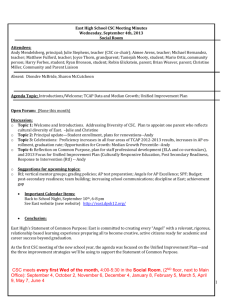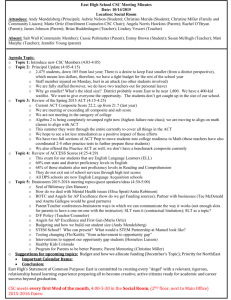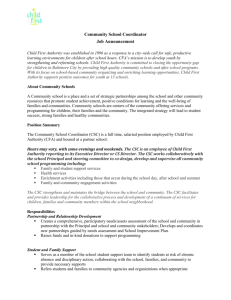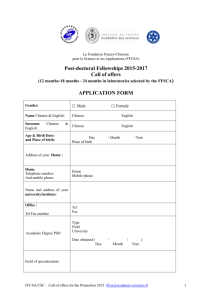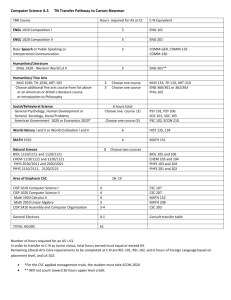Self Assessment - Department of Computer Science
advertisement
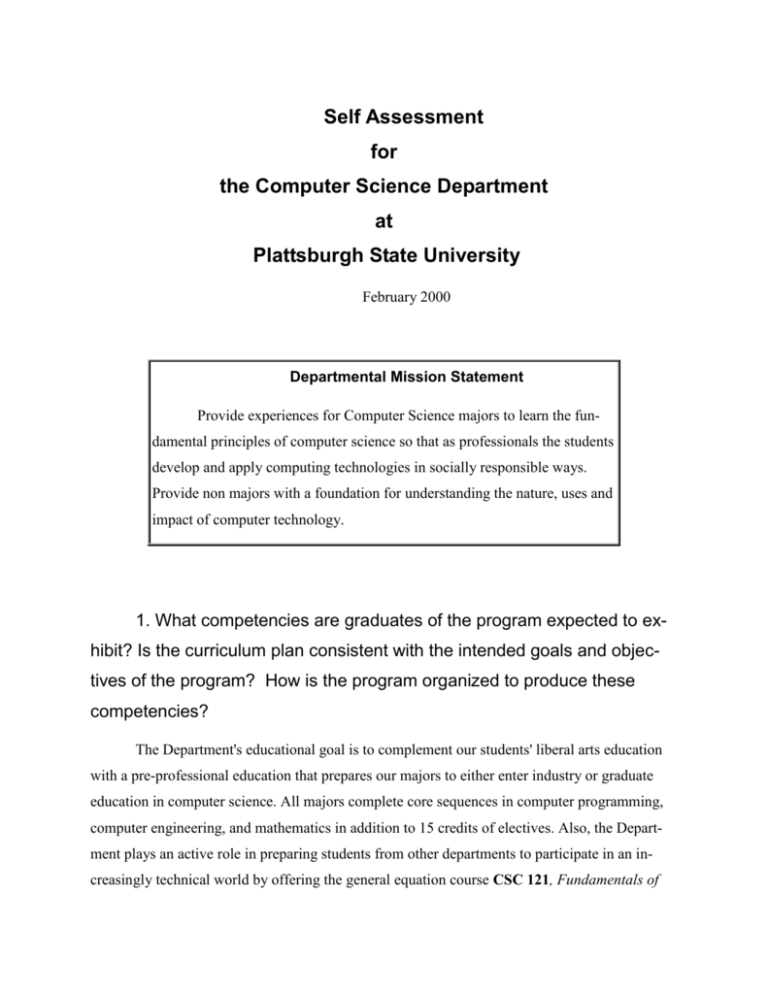
Self Assessment for the Computer Science Department at Plattsburgh State University February 2000 Departmental Mission Statement Provide experiences for Computer Science majors to learn the fundamental principles of computer science so that as professionals the students develop and apply computing technologies in socially responsible ways. Provide non majors with a foundation for understanding the nature, uses and impact of computer technology. 1. What competencies are graduates of the program expected to exhibit? Is the curriculum plan consistent with the intended goals and objectives of the program? How is the program organized to produce these competencies? The Department's educational goal is to complement our students' liberal arts education with a pre-professional education that prepares our majors to either enter industry or graduate education in computer science. All majors complete core sequences in computer programming, computer engineering, and mathematics in addition to 15 credits of electives. Also, the Department plays an active role in preparing students from other departments to participate in an increasingly technical world by offering the general equation course CSC 121, Fundamentals of Computer Science, and offering a minor in Computer Science. CSC 121 is a survey course which gives an overview of the computer science and computers, and develops the logical thinking of students. The minor in Computer Science provides an even more substantial grounding in the science and technology of Computer Science to non-majors. The minor requires an additional 15 credits beyond CSC 121. from the core computer sequence and seven credits of upper level electives. Educational Objectives Our Department has set six educational objectives for the students majoring in Computer Science. These objectives are to: 1. understand the enduring intellectual foundations of computer science, 2. apply software engineering principles in the development of software, 3. promote a social and ethical awareness of the impact computing technology has had, and will have, on the individual, our culture and the world, 4. promote facile use of state-of-the-art software tools, 5. foster the skills needed to work on team software projects, and 6. develop methodologies for independent learning. The following sections elaborate on these six objectives. 1. FOUNDATIONS OF COMPUTER SCIENCE. Each course in our curriculum is structured to develop in our students additional understanding of the underlying foundation of Computer Science. Students are expected to master principles which include data structures, algorithms, models of computation, complexity, computer organization, operating system design principles, and principles of software engineering. 2. SOFTWARE ENGINEERING Students learn basic software engineering in the three core programming courses: CSC 221, Introduction to Computer Science; CSC 223, Introduction to Data Structures and Algorithms, and CSC 321, Object Modeling: Concepts and Techniques. These basic principles are then augmented and practiced in more advanced courses that involve larger programming assignments. Finally, students fully appreciate the value of using good software engineering practice when developing the large group projects required in our advanced courses . 3. SOCIAL AND ETHICAL IMPLICATIONS OF COMPUTER TECHNOLOGY The social and ethical impact of computing on society and the individual is discussed in CSC 121, Fundamental Concepts of Computing, and is central in CSC 372, Computers and Society. Where appropriate, the Faculty stresses the social and ethical issues surrounding the adoption of new technologies, past and present.. 4. STATE-OF-THE-ART SOFTWARE TOOLS. Our students not only need a firm grounding in the principles of computer science, but require facility with state-of-the-art software technology. Without exposure to the latest technologies in software and hardware our students are at a distinct disadvantage when they enter industry. Our students are exposed to modern software tools not only in class, but through internships and independent study. 5. FOSTERING OF TEAM SKILLS Our students learn skills need to be productive members of a software engineering team by participating in substantial team projects in their senior level courses. During these projects they are required to apply software engineering principles that promote productive group software development and are guided in developing an understanding of the social principles that promote effective team behaviors. While, only one of core course, CSC 433, Operating Systems, requires a team project, most of the senior electives do have such a requirement. These electives include: CSC 345, Artificial Intelligence; CSC 441, Data Base Management Systems; CSC 451, Introduction to Computer Graphics; and CSC 457, Introduction to Computer Networking. 6. PROMOTE INDEPENDENT LEARNING. A successful Computer Science professional requires a strong ability for self edification to remain current in the field. Through a curriculum that promotes progressively more and more independent thinking and learning our Department strives to promote an intellectual outlook in our students that enables them to flourish in a profession that requires continual self improvement and independent learning. Overview of the curriculum The Computer Science Department offers two degree programs – Bachelor of Arts (BA) and a Bachelor of Science (BS). The BA degree requires ten core computer science courses, three mathematics courses and a public speaking course. The BS program, our default degree program, augments the core with an additional 15 credits of upper division course work in computer science, mathematics or physics. Both degree programs offers sufficient flexibility to allow a program of study to be developed with their advisor that supports the particular academic and professional interests of the student. The BA program, however, offers students additional flexibility, and is designed for students with either a second major, prior professional experience that compliments their program of study in computer science, or for students who want to take a substantial amount of their coursework in other fields. Students, in consultation with their advisor, decide which degree program is best for them. The overall objective of these degree programs is to broadly educate the student in the discipline of computer science. The Department curriculum is based on the ACM curriculum recommendations. This curriculum expects students to develop a competency as programmers. Three four-credit courses in our Programming Sequence, are used to develop this competency and to introduce the student to the standard curriculum in data structures and algorithms. Since 1993 the Department has used Ada as the students' first and primary programming language. The Department feels that many features of Ada, including strong typing, and generic packages, are very appropriate for teaching the fundamentals of software design. Also, Ada's support for multitasking, using threads, supports our upper division course on real-time systems. However, recent emphasis in the profession on the object-oriented programming para- digm has caused us to rethink this language choice. While Ada does support the object modeling paradigm Ada's implementation is awkward. Whereas in the past, the three core programming courses CSC 221, CSC 223, and CSC 321 all have use Ada, this spring CSC 321, Object Modeling: Concepts and Techniques, is being taught using Java. Given no unforeseen pedagogic problems with Java, the Department expect to change the instruction language from Ada to Java for CSC 221 Introduction to Computer Science in the spring of 2001, and CSC 223 Introduction to Data Structures and Algorithms in the following fall semester. The core programming sequence is intended to develop students' facility with program design, implementation, and testing. The first course in the sequence, CSC 221, is taught using a weekly three hour closed lab that is tightly synchronized with the lectures. These labs are managed by one or two Faculty members and from three or four teaching assistants. An extensive lab write-up is used to guide students in applying the concepts covered in lecture to simple, controlled programming problems. Our experience has been that this level of support is necessary to promote good programming practice, and problem solving skills Our objective, particularly in the first programming course, is to allow the student to develop in a supportive environment problem solving and programming skills. Most importantly, through interaction with the lab instructors nurture confidence in students individual programming skills, skills that will be required to solve the more demanding and complex programming assignments required by later courses. However, the Department also realize that some students may not have the inclination or aptitude required to succeed in the field of computer science, and through these closed labs students can realistically assess their capabilities in a supportive environment. Also to further access a student's capabilities, CSC 221 now has two programming quizzes that are conducted in-lab. These quizzes measures students' performance and serve as warnings to students that perhaps should be consider pursuing other majors. In Spring 1998, the Department also instituted a lab-based, practical programming exam in CSC 223, the second course in the programming sequence. This exam was initiated because the Faculty suspected that some students were over reliant on their fellow students in developing their program assignments. This suspicion was based on difficulties the Faculty perceived among some students with programming projects in upper level courses. Currently, the lab-based exam is a significant part of the grade in CSC 223, and the Faculty intends to make passing the practi- cal exam a precondition for passing the course. While, the Faculty does encourage students to learn from each, the Faculty must insure that each students has the ability to develop software programs independently. CSC 321, Object Modeling: Concepts and Techniques and CSC 314 Non-imperative Programming are the final courses in the programming sequence. Currently CSC 321 covers both object oriented programming and computer algorithms. When the Department switches to Java as the primary computer language CSC 321 will be restructured to focus mainly on computer algorithms. CSC 314 currently uses Lisp and Prolog and exposes our students to two other programming paradigms; giving our students practice in purely functional and declarative languages. Concurrent, with developing programming skills in the core programming sequence, students also learn the principles and current practices in computer engineering in the computer engineering sequence: CSC 333, Computer Organization; CSC 319, C and Unix; and CSC 433, Operating Systems. These courses include substantial computer-based projects which give students an in-depth understanding of the operating principles and practice of real-world computer systems. The mathematics sequence of the curriculum includes eight credits of calculus and three credits of MAT 231, Sets, Functions and Relations, from the Math Department. The Department supplements these three courses with a three credit course: CSC 317, Discrete Structires. This math sequence helps develop in our students an appreciation of the theoretical foundations of computer science, formal models of computation, and tools for estimating complexity. Additionally, these courses develop deductive analysis, which the Faculty feels is essential for the computer science professional. The final thread in our curriculum promote a social and ethical awareness of the impact computing technology has had, and will have, on the individual, our culture and the world. CSC 121, Fundamentals of Computer Science introduces these concepts and CSC 372, Computers and Society, has these concepts as its central theme.1 With a course enrollment limit of 25 stu- 1 . CSC 372 also fulfills the College wide advanced writing requirement. dents the instructor is able to give substantial instructor feedback to students. 2. What are the strengths and weaknesses of this program? Our program has many strengths. they include: a Faculty that is small and adaptable, cohesive and collegial with each other; caring and competent with our students. a Faculty that is accessible to the students. Our offices are immediately adjacent to the student lounge and commons, and one of computer labs. If students have questions, Faculty are nearby. If a student has a question pertaining to a specific technical problem or programming assignments students can easily demonstrate their problem to the Faculty in the computer lab. While, the Faculty have posted office hours (about five hours per week), the integration of offices, lab and common space promote the interaction between students and Faculty throughout the day. a curriculum that provides a balance between the practice and science of computer science. a Faculty that strongly support the goals of our General Education program: to produce professionals not that just to earn a living, but also live a life. a Faculty, that though small in number, come from diverse backgrounds – engineering, computer science, mathematics, physics, and industry. a program that allows transfer student to complete the requirements of the Computer Science major in three years. The program's weaknesses include: a Faculty with little contact with local industry. While the Department have placed interns and graduates in a few companies – Georgia Pacific, Wyeth Ayerst, International Paper, Champlain Valley Physicians Hospital, and Schonbek – these programs are small and our contacts with them have been infrequent. a student body that is not sufficiently diverse. While recently the number of women and minorities among our majors has increased, the percentage of minorities is still below that for the College as a whole or SUNY. a class schedule that does not offer core classes every semester. Because of staffing limitations, the Faculty cannot offer every course in our core curriculum each semester, nor offer every upper division course every year. This has the adverse impact of delaying the graduation of some students, and causing several semester-long gaps in the programs of study of students between consecutive class in a sequence. 3 Do students and members of the Department have an insight into the rationale and the intended outcomes of the programs for both major and minor? As students complete their second year of study, they develop a program of study with their academic advisors. Students in the BS program must develop a coherent concentration from their elective requirement of 15 credits of upper division courses. They can chose courses computer science, mathematics and Physics2. Currently students can select from such concentrations as: Algorithms and Computation, Real-Time Embedded Systems, Software Engineering, and Network and Database Management. The current state of our curriculum seems to be a continuous topic of conversation among our Faculty. Current issues of concern are: Migration from Ada to an object oriented programming language like Java in our three course sequence in programming. Developing students' problem solving abilities and their programming abilities in a continuous way, so that at the end of the programming sequence students are able to imple- 2 Systems. The Physics department also offers an electronics course which is useful for students taking Real-Time ment any algorithm that they can specify. Limited course availability makes it difficult for students to develop a program of study. The Faculty finds that students are pressed to select courses based on availability rather than on their academic interests because most of the upper division course are offered only once every two years. This is a problem not only for the students, but for the Faculty as well. Especially when teaching advances courses, where teaching material developed one year is obsolete by the time the course is offered again. No course offerings in information systems. A minor in information systems is being discussion with our School of Business and Economics. However, the Faculty's concern is that if the Department has students from both the Computer Science program and an Information Systems program enroll in the same upper level courses the Department will be force to change course curriculum to accommodate the less technically proficient students of an Information Systems program. The Faculty does not want to dilute our expectations in our upper division courses like operating systems and computer networks to accommodate the students coming from the business world with less computing experience and no programming competency. 4. How are course outlines updated? Is there coordination of multisection courses? The Department reviewed all course offering and revised most course in 1995. Several courses have subsequently been revised when a Department member felt it necessary. Revised and new course outlines require approval from the Department and a standing committee of the Faculty of Arts and Science. At present, the Department regularly offers only one multi-section course, CSC 121, Fundamental Concepts of Computing, and only one course with multiple laboratory sections, CSC 221, Introduction to Computer Science. The laboratories of CSC 221 are identical and very tightly coordinated. However, CSC 121 has so far been only loosely coordinated by informal conversation among the instructors. It would be worthwhile for the instructors of CSC 121 to meet formally several times a semester. 5. Is there a clear identification of subject areas or courses offered outside the program that provide appropriate support for the major? Minor? All computer science majors are required to take four specified mathematics courses. In addition, any upper division mathematics course, as well as the electronics course from the Physics Department, may be used as part of the 15 hour upper division electives requirement in the BS program. There are many departments at the College which offer course work that benefit students with particular interest (e.g. art, psychology, philosophy, business, biology). Advisors help students identify useful supporting course work and discuss the possibility of an outside minor. 6. How does general education support the goals of your programs? General Education supports the goals of our program by including in the Learning Skills component courses in writing, logic and mathematics which develop the problem solving and reasoning skills of our students. The required writing courses, in particular, are especially valuable in developing our students' ability to think clearly and logically. Conversely, the Department support the goals of the General Education program by actively encouraging our students, both informally and during advisement, to take courses which broaden their minds. Our most successful alumni tell us that the General Education courses in writing and communication were the most valuable for their careers and the enrichment of their lives. 7. How do our programs compare with similar programs in other public and private schools in New York? Is there any way in which our program is unique? It is difficult to accurately assess how our program compares with other public and private institutions in New York State. Certainly our Real-Time course based on model railroads is unique, although the hardware is old and requires upgrading. Currently, the Department must decide whether to continue using the railroad model or adopt some new teaching paradigm, such as robots. Also, our balanced approach between a theoretical/math-based and a practical software engineering curriculum, while not unique, is particularly beneficial for our students. A comparison of our curriculum was made with the Mathematics and Computer Science Department at the Lehman College, CUNY. At Lehman the department offers two different Computer Science Majors and also a Computing Management Major —i.e. Computer Information Systems Major and Computer Graphics Major (Computer Imaging). While most courses required for these majors are offered by the department, some are offered by the Business and Arts Departments. Our Department at Plattsburgh is developing a plan which could lead to introducing a Computer Information System Major in cooperation with the School of Business and Economics. Introduction of this major would require an additional Faculty line in this particular area. There is anecdotal evidence that such a program would meet with great interest among the students. 8. Do the students participate with Faculty in the identification of learning needs, in the evaluation of performance, and in evaluation of learning experiences? Are there channels for the receipt and consideration of student views and grievances? Students are asked to evaluate instruction in every course they take whether the course is taught by tenured or non-tenured members of the Department. The Department has supplemented the standardized SIR's used by the College with a feedback form developed by the Department. A Faculty member will achieve tenure only if they can document effectiveness as a teacher. Student satisfaction with the quality of instruction, as measured by the SIR and additional questions, is a crucial part of the evaluation of teaching.3 Faculty get feedback from students during advising sessions that tell us what problems students are having with a particular course. Students with particular grievances consult with the chair. Additionally, the College has official grievance procedures. The Faculty occasionally invite students to Faculty department meetings when curricular issues are to be discussed. These invitations have been sporadic and are ad hoc. The Department would like to have more student involvement when the Department do curricular planning 3 While, the SIR’s are used to evaluate teaching, they are not used to evaluate the effectiveness of our courses or our program. because it would provide a way of sharing our views on what is important in our discipline. 9. Is there flexibility in program planning which reflect the individual competencies students bring to the program, their various career goals and their rates of progress toward attainment of outcomes expected? Students who transfer to Plattsburgh with substantial programming experience (more than 6 credits) can receive partial or full waving of the core Programming Sequence. If a transfer students is not fluent in Ada, they may opt to take CSC 220, Ada for Transfers, a one credit course where students work under an instructors direction to quickly Ada. Upper division students are encouraged to seek out independent study opportunities to work with our Faculty. In recent years students have developed projects in robotics, and done more advanced study on the theory of computation. 10. Are there any problems with career advising for the students in the program? How could problems be resolved within the frame of liberal arts education? Advisors review student resumes and prepare letters of reference at students' requests. It has been suggested that the Faculty urge all majors to maintain a web page that reflects their professional interests and includes advanced programming projects. Students who are interested in attending graduate school normally speak with Dr. Plaza and Dr. Linder as they have had the most recent direct experience with graduate programs. The Department poll alumni every year in order to track what they are doing professionally. Alumni often contact us with entry level openings. Occasionally companies come to campus explicitly to recruit our students either for employment or as interns. However, the Career Nights organized by the College's Career and Life Planning office have not been particularly useful for our graduates. The Department also post on a bulletin board, notify graduating students by email and post on the web employment possibilities that come through our Department. The Faculty has also noticed that a number of students who are about to graduate often have no clear professional interests. While we attempt to develop a programs of study for all students that will leave them with a core competency, problems with scheduling mean that many of a student's upper level electives are often unrelated. Without this academic focus in their senior electives students feel unsure of their marketability and employment prospects. 11. Should the Department offer any graduate courses? Currently the Department does not offer any graduate courses. Our Faculty does supports graduate research conducted by students in the Center for Education Services by acting as their thesis advisors. The Office of International Enrollments estimated that if a graduate program in computer science were in place at Plattsburgh at least 120 foreign students would enroll. There also exists anecdotal evidence that many computer science undergraduates would be interested in extending their studies at SUNY Plattsburgh if there were a Masters program. The Department is considering plans to offering both a MS and MA degrees in Computer Science. It is expected that the graduate courses would concentrate around the current strength of the Department: software engineering; and real time and embedded systems. 12. Does the departmental organization support a clearly delineated system of authority, responsibility, and effective communication? Yes. The chairperson sees to it that Department members have ample opportunity to discuss issues affecting the Department and then strives to arrive at a consensus. The Chair also facilitates the effective implementation of departmental policies. 13. Do workloads vary among members of the Department? What is the rationale on which variable workloads are assigned? Most Faculty have a teaching load between eight and ten credit hours per semester. The Chair insures that on average each faculty has a load of nine credit hours. The Chair, because of his administrative duties, has a reduced teaching load. A Faculty member who performs research under an external grant may buy-out teaching. This is arranged in cooperation with the Office of Sponsored Research and Programs and the Dean of Arts and Science. Every Faculty member can teach any of the lower level courses and those higher level courses which are close to their area of specialization. Assignment of courses for the coming semester is always discussed in a Departmental meeting, giving all Faculty a forum to state their preferences; later the chairman taking these preferences into consideration makes the final assignments. 14. Are the guidelines and procedures for Faculty evaluation adequate? In which way can it be improved? The College has established policies for the performance review of all faculty. Faculty, eligible for reappointment, tenure, or promotion, are evaluated in the areas of teaching, scholarship, and to a lesser extent, service. The evaluation of teaching is based both on course materials self evaluation provided by the instructor, and student evaluations. Currently, in our Department, student opinion is gathered by the SIR questionnaire and Departmental. While, the SIR is not a very effective instrument for analyzing student satisfaction, it does give a general idea of the level of student satisfaction with a course. However, the SIR has not been helpful in understanding reasons for student dissatisfaction. On occasion senior members of the Department have attended junior members' classes for the purpose of critiquing effectiveness of teaching. Supplementing these more formal mechanism, members of this Department often participate in informal discussion on teaching methodology. It has been suggested that the Department develop a procedure to more actively involve students in providing feedback to Faculty on their teaching. Also, new Faculty members begin employment essentially the day before the start of classes. This means that preparation for the next semester is either done on the new Faculty members own time or is not done at all. The College should consider beginning employment a month or so before the beginning of class. Another suggestion raised regarding Faculty review would have a senior member of the Department visit at least one class per semester of each instructor. 15. Are the guidelines and procedures for assessment of student achievement adequate? In which way can it be improved? Course syllabi describe how students will be evaluated. Typically assessment includes quizzes, midterm and final exams, and graded student programming assignments. The Department believe that, in general, Faculty are successful in assessing student performance and achievement. As an example, in CSC 221, Introduction to Computer Science, each student is evaluated over forty times during the semester through the use of weekly quizzes, in-lab and post-lab programming exercises as well as a comprehensive final examination. Two of the quizzes are conducted on-line and in-lab, and allow the student to make a realistic self assessment of their progress. An additional and more comprehensive lab exam is administered in CSC 223 Introduction to Data Structures and Algorithms, the second course in the Programming Sequence. The Faculty is very concerned that both formative as well as summative assessment is made on a fair and timely basis. Additionally, several of our upper level courses – operating systems, graphics, computer networks – require a group project in which the student's knowledge, skills and behaviors are comprehensively evaluated. Improvements to the process of student assessment that are being considered include introducing portfolios (possibly web based), and developing a student peer and self-assessment protocol. 16. Has the Department organized its Faculty, facilities and budget resources effectively to achieve the goals and objectives of its total program? Are the resources spread too thin? In the past, Department Faculty has not had any responsibility for computing facilities, beyond providing (and sometimes helping to install) appropriate course software. With the department acquiring in the summer of our own Departmental computing the Department may for the first time require that one of our Faculty receive teaching release for the purpose of supervising and maintaining our new lab. At present the Department has two labs that are used to teach: CSC 416, Real-Time Systems; CSC 419, Programming Project; CSC 457, Introduction to Computer Networks and CSC 452, Introduction to Computer Graphics. These facilities have no continuing funding base. When equipment requires repair or upgrade the Dean's Office most appropriate funds. Funding for equipment has come form the Dean's Office and the NSF. In the past, the Department has used in-house grants, and special requests to the dean to provide computing equipment support for CSC 457 and CSC 452. The Train Lab was funded initially by the NSF grant. The absence of a maintenance budget for these labs has been a problem particularly in the Train Lab where both the computing equipment and the train hardware are obsolete and well worn. Unlike other science departments at Plattsburgh, the Department has never had a budget of our own to support the laboratory component of our teaching efforts. On occasion the Department has requested that the Office of Computing Support buy software specifically for our teaching needs. The College's position has been until recently that computing facilities should be managed on a campus wide basis rather than by Department. So our students would share computers in labs and classrooms with the general student population. The Department had no control over operating systems or physical configuration of these labs. Three years ago the College began to modify its position regarding computing support. The College gave us the Department 50% of an DEC Alpha Computer running Unix Computer for use by the Department's students4. However, we still do not have administrative or physical control of this machine. Often the mission of the Computing Support Department is at odds with the pedagogical use of the campus computing resources. It has become evident that the security software installed on all Campus computers by the Computing Support Department and Computing Support's desire for secure systems is at variance with our need to have open access to computing resources, with perhaps a compromised level of security. The College has recognized this difference in use by the Department's students of computers and the general student populace, and has provided a very generous allocation of funds to build and maintain a physical lab of 40 work stations. this new laboratory will be operational next fall for the exclusive use of our students. However, what needs still to be resolved is the issue of system support and administration. 17. Is there sufficient Faculty expertise to make this a quality program 4 The other half of the Alpha supported students web pages. for any student who might have alternative learning styles? How are Independent Study and Undergraduate Research used to meet these needs? Any improvement required? There is sufficient Faculty expertise to make this a quality program for all students including those with alternative learning styles. Two of the Faculty have substantial industrial and government experience and one has consulted with business. Coupled with our academic backgrounds and our sensitivity to diverse students with special needs, the Department believe that we are very responsive to the needs of all of our students. We seek to retain the more able student by providing additional challenges and individual tutoring both formally or informally. For the less able, the Department provide group help sessions and individual office hours. Student teaching assistants who also hold office hours; and the College provides additional support at the Learning Center. We could do better by improving our outreach to our middle ability students; typically our assistance is sought only by students at either end of the ability spectrum. We also need to determine how this type of service would affects the Faculty workload. 18. What opportunities do students have for Independent Study and Undergraduate Research? How could these opportunities be increased? Students have carried out independent studies in recent years. Several have assisted Faculty with projects in robotics and data communications. We would like to encourage students to do more independent studies and begin to promote undergraduate research. 19. How does Faculty scholarship contribute to the effectiveness of your programs? What would you need to further support scholarship/creative efforts? Dr. Linder's area of research involves robotics that will have an obvious curricular impact through the Real-time Systems course CSC 416. Dr. Plaza's research involves logic programming and enriches courses such as CSC 314 Non-imperative Programming, CSC 345 Artificial Intelligence, and CSC 441 Database Management Systems. Much of our "creative effort" has gone into designing projects for students and creating the supporting software and hardware that is used in our courses. The measure of Faculty scholarship is different here than at research oriented universities. "Scholarship" is recognized by the College to include disciplinary and pedagogical research, organization of or participation in professional meetings, refereeing, etc. The creative intellectual work that goes into developing new projects for a course will be recognized as scholarship when presented at conferences or published in journals of computer science pedagogy In-house grants have been useful for exactly this kind of activity. Since our Department is small we find that each of us teach upper division courses in several different areas. It takes intellectual energy to keep current. An increase in traditional research activity would benefit our program by improving our Department's reputation and inject greater enthusiasm for the teaching of related courses. Clearly if the Department develop a Masters level program we will need to increase our level of research. 20. Has the College adequately supported the hardware and software used by our students in labs and in the computer classrooms and the smart classrooms used by Faculty. The lack of direct control over our labs has had a negative impact on our teaching mission. Not until next semester will we be able to end the use of ASCII terminals by our student. The long lead time requested by computing support for installing software in labs and classrooms has had negative consequences, and limits the Faculty's ability to incorporate new materials in their courses. The College recognizes the problem and has allocated substantial funds for a student lab to open next fall. The lab will have 40 workstations, and file servers. The lab will be under our direct control and will be open to our students when not in use as a closed lab or teaching classroom. The College will maintain the hardware on a continuing basis with a replacement schedule consistent with other hardware on the campus. We have not resolved the problem of how the lab will be administered. We believe that technology decisions have been made at the administrative level that have had significant impact on teaching (for other departments as well as ours) without sufficient participation of representatives of these affected departments. These policy decisions include: what hardware is acquired for Faculty, when machines are upgraded, what operating system is used, choice of desktop software, what security software is installed on computers in "smart" classrooms, where does hardware documentation and software media reside, dial up access for students (currently 28K and no internet access from off campus), access of faculty computers from off campus, and network bandwidth for access of off campus resources.. The College does have a campus wide technology review committee, but the committee did not meet last year. We suggest that the College have the committee meet regularly and consider augmenting computing technology support services at all levels. This issue is critical both for our Department and the College. We would hope that our external evaluators might help here with specific recommendations. Decisions about network security (firewalls, and subnets) have been made with consultation with our Department. Although, at times the Department had hoped for more open systems to result from these discussions we do feel that our input had been considered. We have found very cooperative support for network related support in the real-time and networking labs and in the small student lab located by our Department. It is probably the case that the number of man hours dedicated by the College to software support for students and Faculty precludes supporting multiple operating systems and allowing shared PC's in classrooms to do any more than run a fixed set of applications. Individual members of Computing Support have helped our Faculty on their own time to solve software problems for software not officially supported by the College. 21. Are the Library’s holdings adequate to support the teaching mission of the Department? The College has a subscription to all publications of the ACM. There are copies both in the library and in the Department. Furthermore, there are three licenses for on-line access. However, the standard reference materials are old and need to be updated. In the last two years more money has become available for new acquisitions so it is suggested that the Faculty submit requests for material supporting our teaching and research. The holdings for technical journals, including, computer science related journals, are also meager, but the College has a very good interlibrary loan service that some what makes up for this deficiency.
